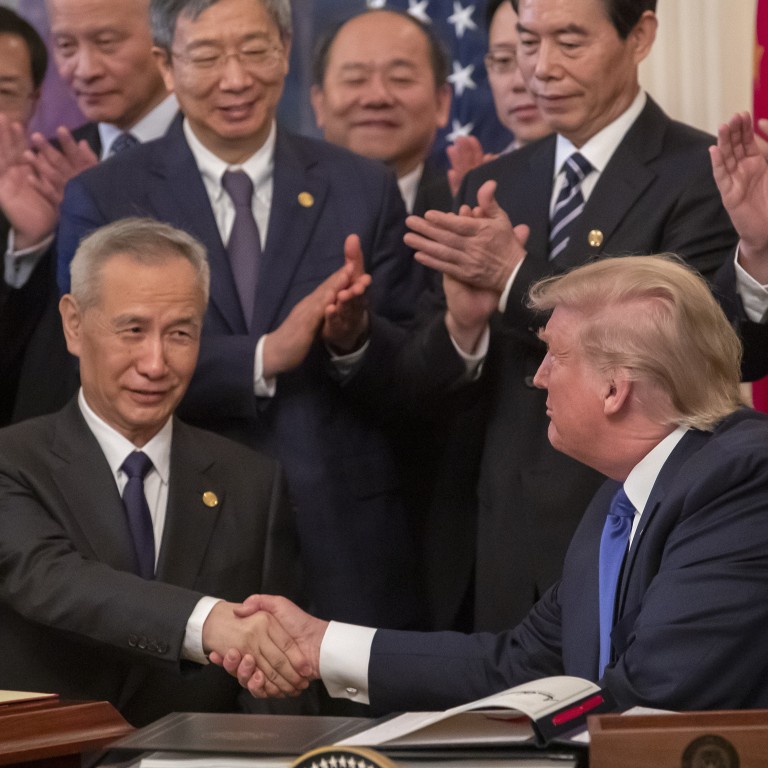
China revamps trade negotiation team ahead of possible fresh talks with Biden administration
- China’s Ministry of Commerce reshuffle lays out new trade team that would work directly with the United States, and in other international forums
- Joe Biden said last month that he will maintain current trade tariffs on China and make no immediate changes to the phase-one deal signed a year ago
Beijing reshuffled its trade negotiation team ahead of Joe Biden’s presidential inauguration, in the latest sign China is preparing for a possible resumption of bilateral trade talks with the United States.
“China needs experienced officials to enhance its strength in negotiations,” particularly in terms of setting rules in international forums, deals and reforms, said Zhang Monan, lead researcher with the Department of American and European Studies at the China Centre for International Economic Exchanges, a Beijing-based think tank.
“[China] is now taking the initiative, rather than responding passively. [The appointments] are not only for China-US talks, but also for the development of multilateral rules.”
The priority for talks with the US will be normalising economic and trade ties, with the focus on high standards and rule implementation, Zhang said.
“We tend to believe that the Biden administration will continue to implement the phase-one deal signed a year ago,” Zhang Monan said. “The most urgent thing is to resume trust-building contacts and gradually reopen talks.”
“Many structural issues such as market access and [government aid to] state-owned enterprises shouldn’t be insurmountable barriers between China and the United States,” Zhang Monan added.
Wang Yiwei, a professor of international relations at Renmin University of China, said that the new trade-negotiator appointments are a sign of goodwill and an olive branch extended to Washington.
“China has already made plentiful preparations,” he said. “Meanwhile, the Biden administration needs to cooperate with China in areas such as pandemic control and climate change.”
His China policy team has largely been formed, including Antony Blinken as secretary of state, Jake Sullivan as national security adviser, trade representative Katherine Tai and senior China director Laura Rosenberger. Obama-administration veteran Kurt Campbell will be Biden’s White House coordinator for the Indo-Pacific region.
But in the first part of his presidency, Biden is expected to focus his attention on domestic issues, particularly controlling the widespread coronavirus outbreak and enacting policies to support the economy, such as his US$1.9 trillion rescue plan unveiled last week. At least initially, engagement with China is likely to take a back seat.
“It makes no sense for [Biden’s team] to quickly engage with China directly. Their domestic agenda is urgent and broad, while negotiating with China is a political liability,” said Derek Scissors, a fellow with the American Enterprise Institute.
“Quiet, lower-level talks can start when the US personnel are in place, but the more attention they get, the worse it will be for Biden right now,” he said.
Ding Yifan, a senior researcher with the Development Research Centre of the State Council, said that Biden’s proposed US$1.9 trillion stimulus package and personnel appointments reflect the mindset of “competing with China in a Chinese way”.
Washington could anchor bilateral trade relations on improving domestic jobs and welfare, rather than advancing a trade-confrontation strategy to facilitate the market expansion of multinational companies in China, Ding told Tencent’s capital market seminar on Monday,
Robert Rogowsky, who heads the international trade and economic diplomacy programme at the Middlebury Institute of International Studies, said it would be wise to re-establish thoughtful and productive dialogue with China immediately.
Biden may put 5G technology, a re-evaluation of trade war, and restarting bilateral investment negotiations higher on his China agenda, and will focus mostly on trade-policy enforcement and compliance issues, Rogowsky predicted.
However, Trump’s trade war will not be wound down quickly. “I suspect each step in unravelling it will be negotiated, and concessions are expected,” he said.

